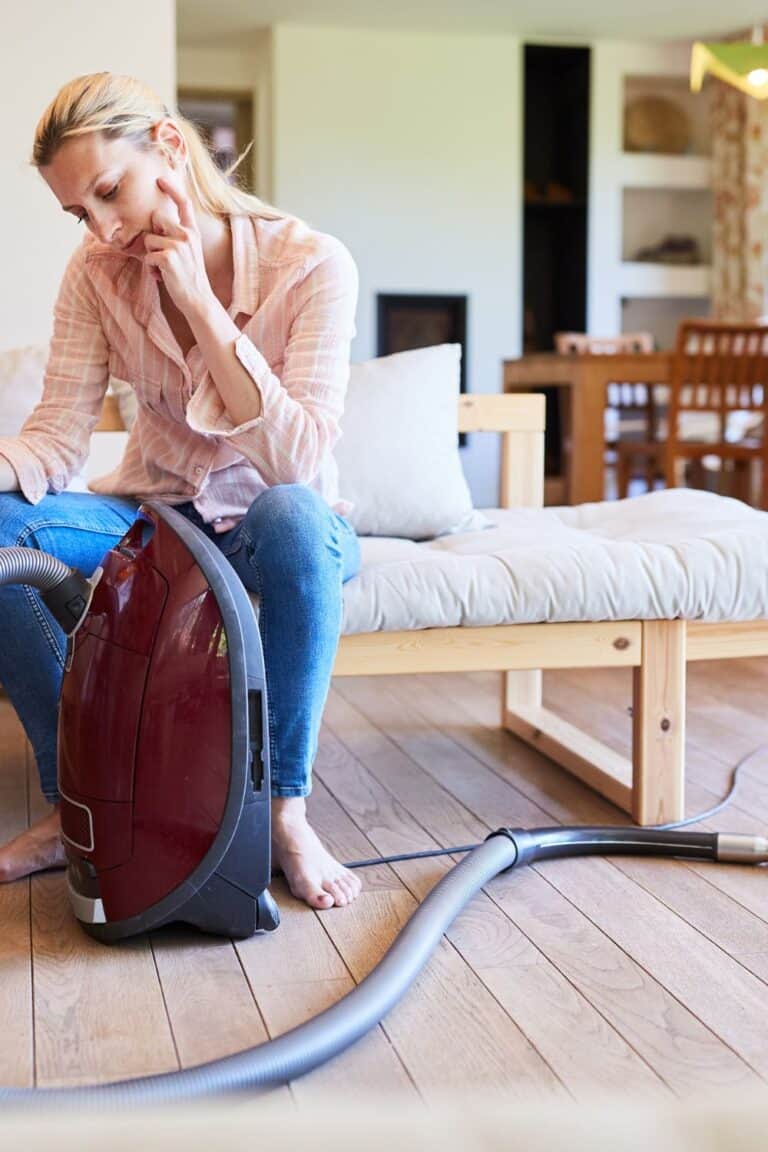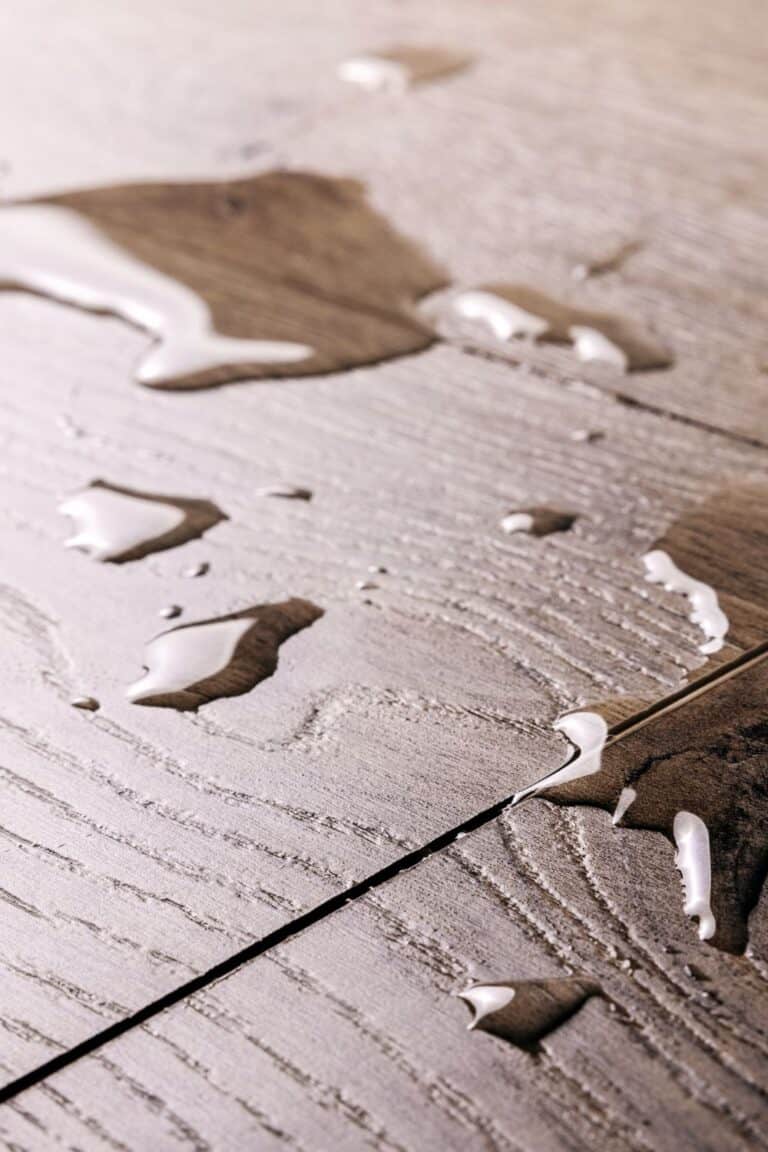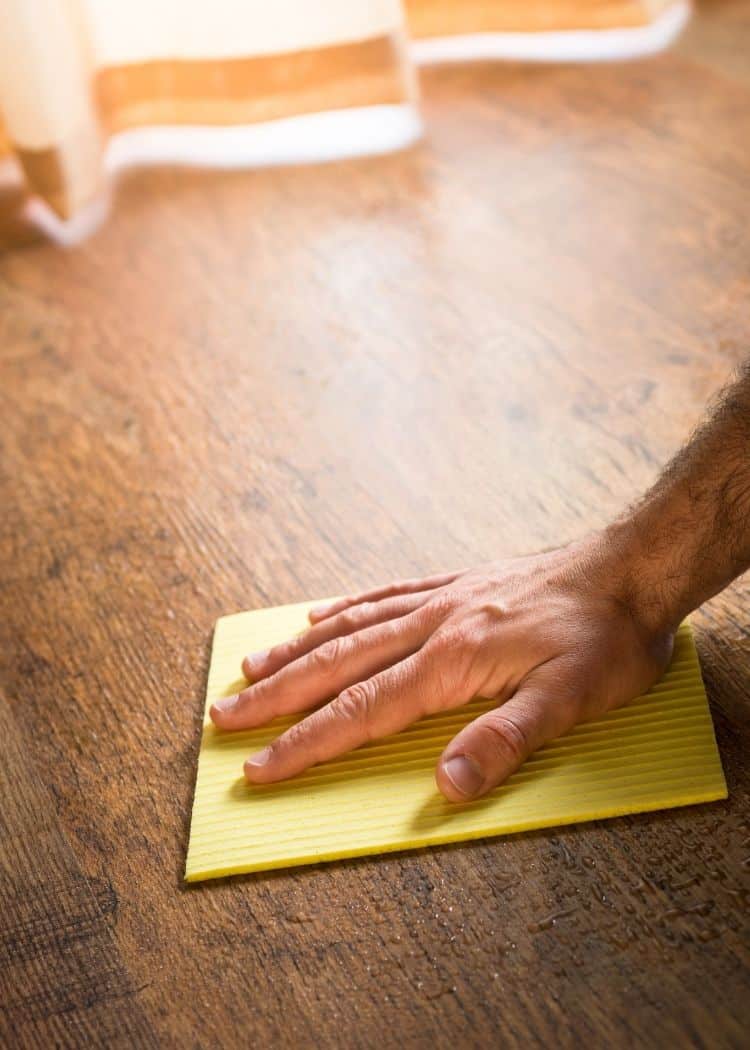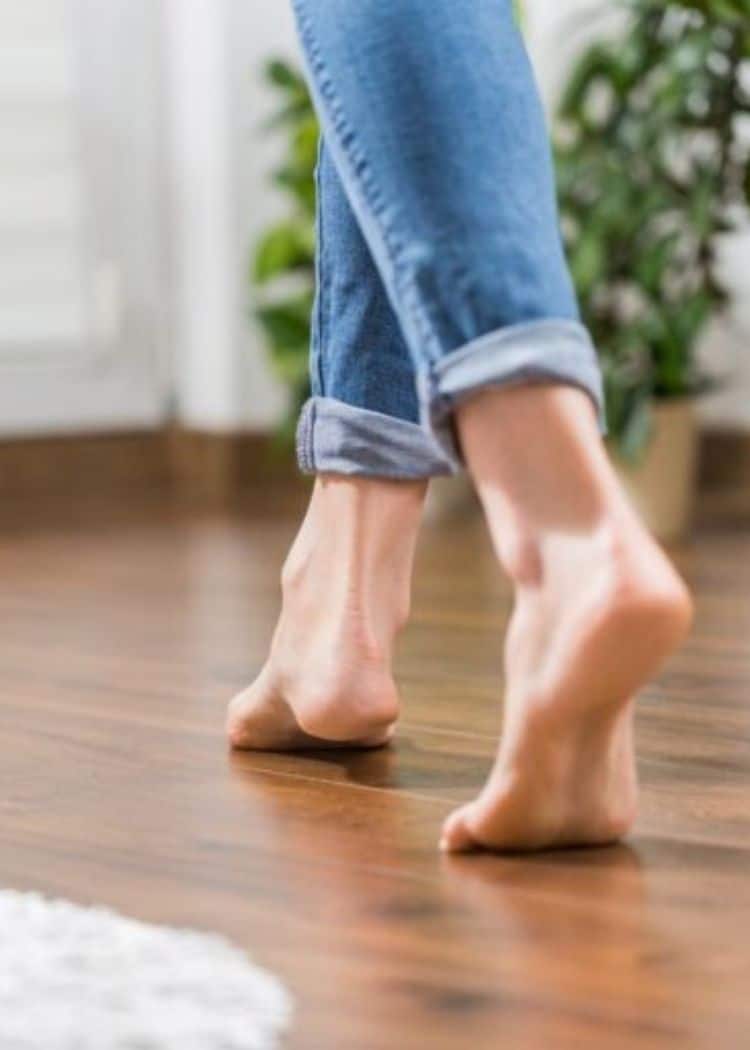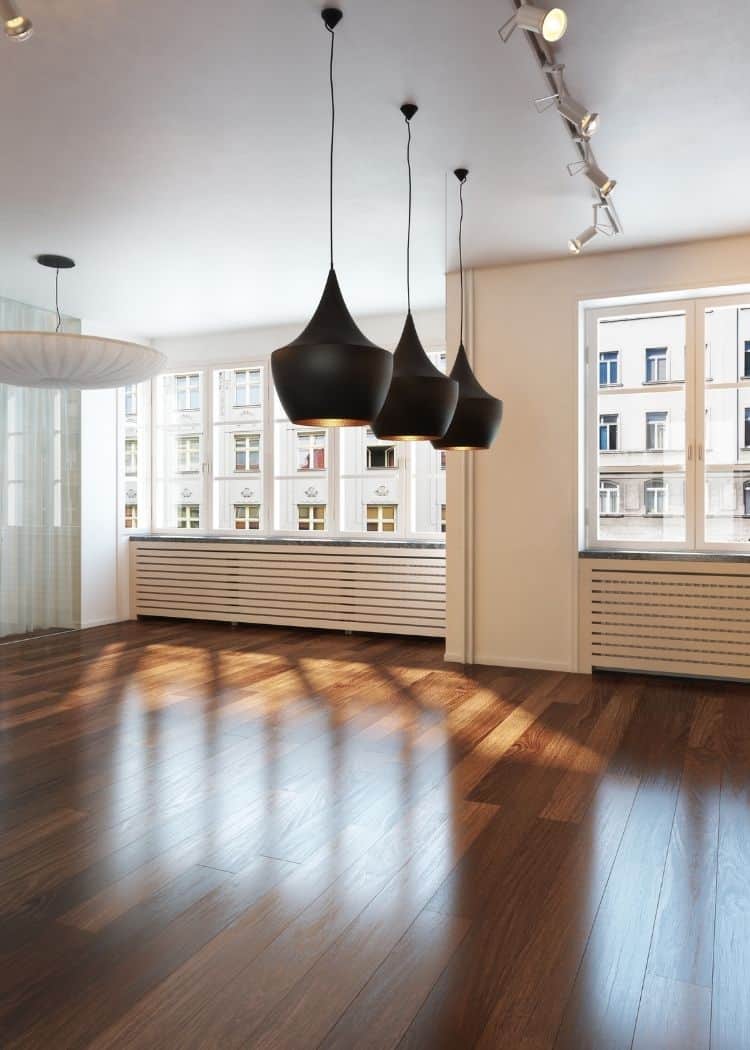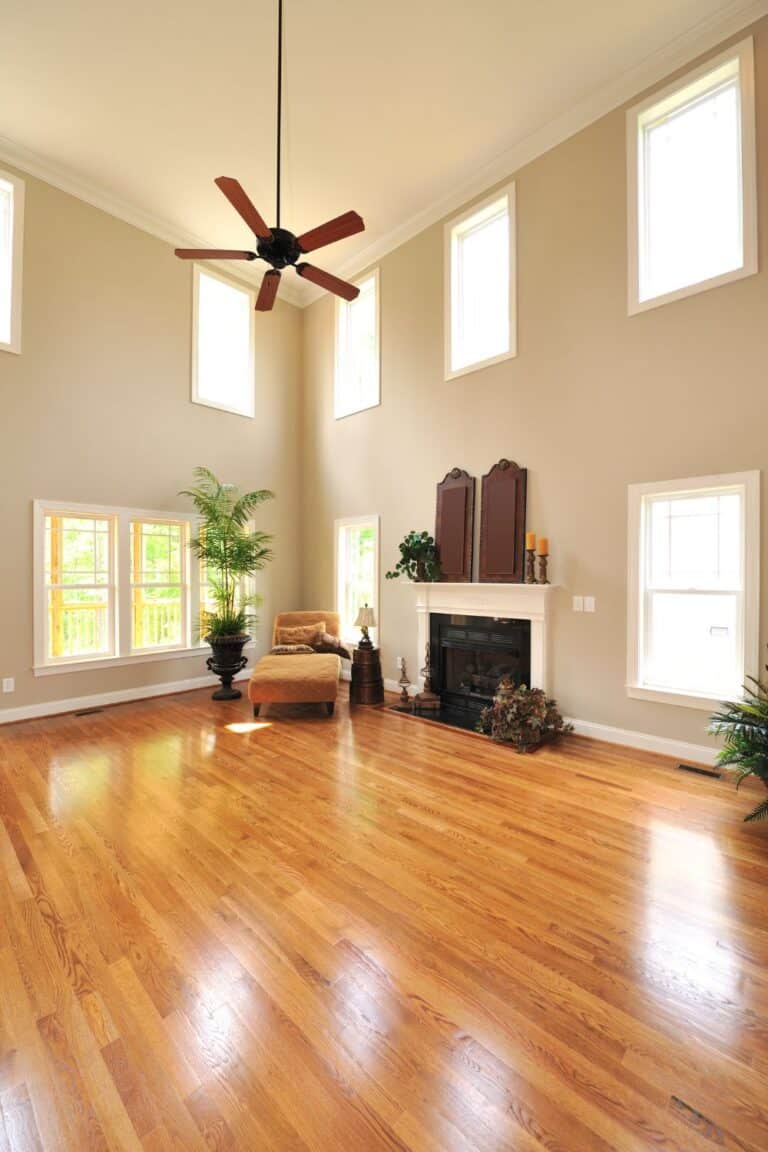Water-Based Polyurethane VS. Oil-Based Polyurethane Floor Finish
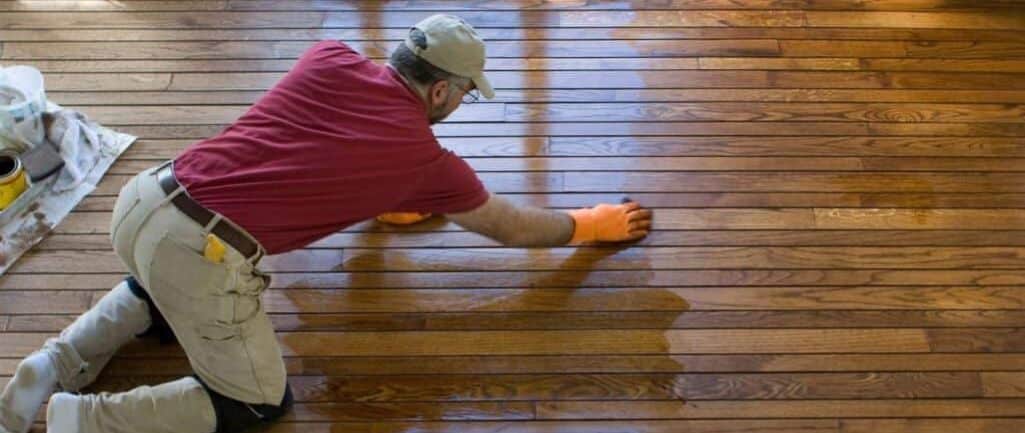
There are various aspects to staining your hardwood floors. In this article, I’m going to discuss what I consider to be the best polyurethane for hardwood floors. Polyurethane is a protective finish that is applied to hardwood floors to protect them from wear, tear, and water damage. It is available in two types: water-based and oil-based polyurethane.
People ask, what is the best polyurethane to use on hardwood floors? It really comes down to preference, time, and money. Water-based polyurethane is quick and easy but it’s more expensive. Whereas oil-based is cheaper but it will take longer and you will need to leave your home for several days.
✔️#1 If you want to bypass all the reading, then I will tell you upfront that BONA TRAFFIC HD (HIGH GRADE) is the number one best-selling product.
This post may contain affiliate links, ie., I earn a commission if you decide to make a purchase and sometimes if you just click on a link at no additional cost to you. Please read my Disclosure Policy for more info.
Water-based polyurethane is the most popular type of polyurethane for hardwood floors because it is easy to apply and quick to dry. It also has a lower VOC level than oil-based polyurethane, which is better for the environment. However, water-based polyurethane is not as durable as oil-based polyurethane and it may yellow over time. Water-based polyurethane is more environmentally friendly and has less of an odor, but it does not last as long as oil-based polyurethane. It is advisable to coat your floor multiple times to give it the best protection.
Oil-based polyurethane uses mineral solvents or oil (petroleum) as the base. You know that it is oil based as it is a brownish-looking liquid that is very thick; much thicker than water. It has a slightly amber hue to it and will naturally darken over time. If you have gone into a home that has stunning aged hardwoods that have a deep rich color to them, chances are you are looking at oil-based polyurethane. Traditional woodworkers love oil based because of its longevity and its ability to withstand traffic.
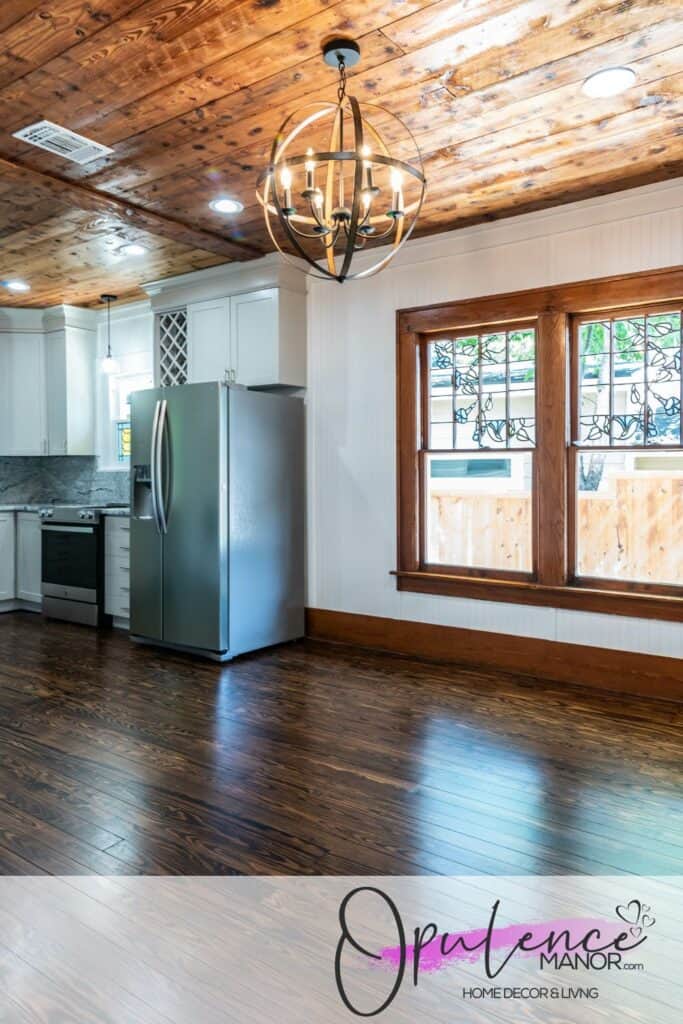
There is nothing better than walking into a beautiful home that has absolutely stunning hardwood floors. Hardwood floors add unprecedented value to any home. As a real estate broker, I fully understand the value that hardwood floors bring to home value. One of the reasons I picked the home I currently own was in part, the incredible, original hardwood floors, which I subsequently had sanded and refinished. I used Bona Traffic HD on my floors
Hardwoods add depth and character to your home. It doesn’t matter if they are made of bamboo, oak, maple, hickory, ash, ebony, or cherry and align with the current hardwood design trends; all floors need protection. There are two types of polyurethane, water-based polyurethane, and oil-based polyurethane.
There are both pros and cons to using either. Water-based is better for the environment on the front end as its VOCs (Volatile Organic Compounds) are lower. However, when you consider that you will no doubt re-do your floors more often when you use water-based vs oil-based, are we really protecting the environment? Water-Borne polyurethane has a quick drying time, hence you won’t need to be displaced from your home, whereas oil-based poly is a project and you will need to make arrangements to stay elsewhere, while the floors are drying.
In this article, we will discuss the following:
- Best brands of water-based (waterborne polyurethanes)
- Best brands of oil-based polyurethanes
- pros and the cons comparison guide on Waterbased vs. Oil-based Polyurethanes
- List of 13 Polyurethane Brands
What Is Polyurethane?
Polyurethane is a plastic material. I bet you didn’t know that. It exists in a wide variety of forms. Polyurethane is found in everything from building insulation, shoe soles, coatings, mattresses, and even car parts to name a few.
As it pertains to floors, it comes in a liquid form. It subsequently hardens and provides a protective coating over your hardwoods. The purpose is to protect the wood from a wide variety of dirt, spills, oils, water, pet urine, and more.
What Are VOC – Volatile Organic Compounds
Volatile organic compounds are compounds that have high vapor pressure and low water solubility. If you have ever opened a can of paint or stain and were instantly overwhelmed with the smell, what you are smelling is the VOCs. You will want to look for products with low VOC. The term organic in VOCs should not be confused with organic as in organic foods ( something that is chemical-free). The EPA has an in-depth article that you can take a look at – What Are Violative Organic Compounds (VOCs)?
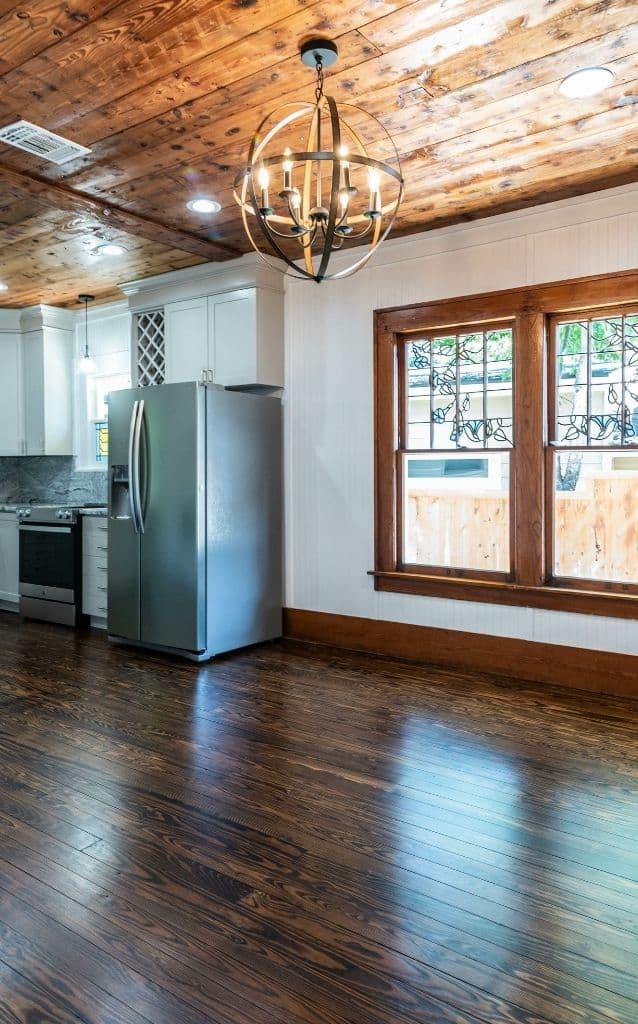
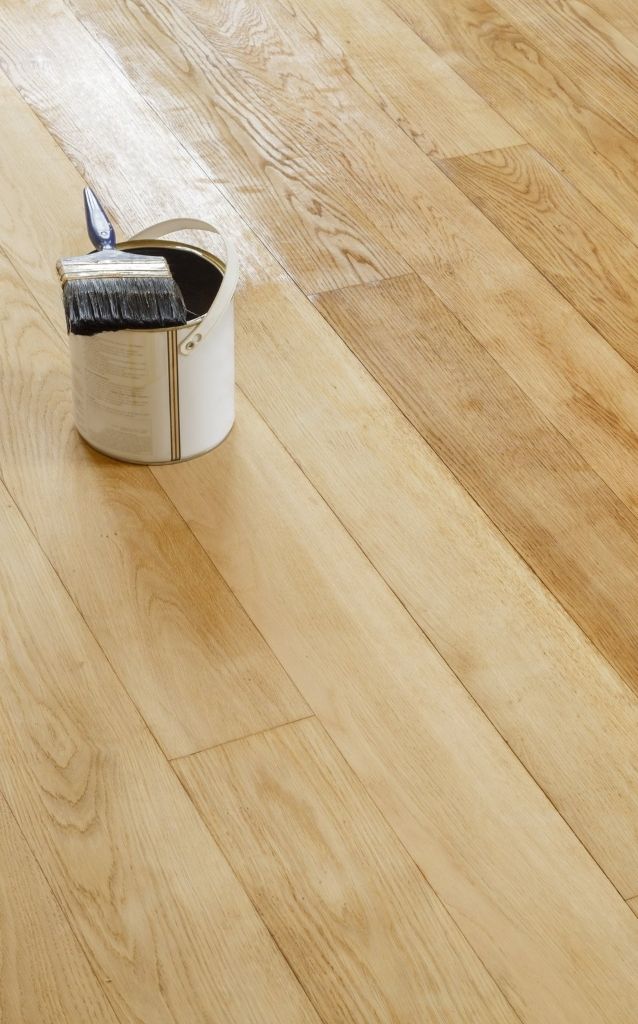
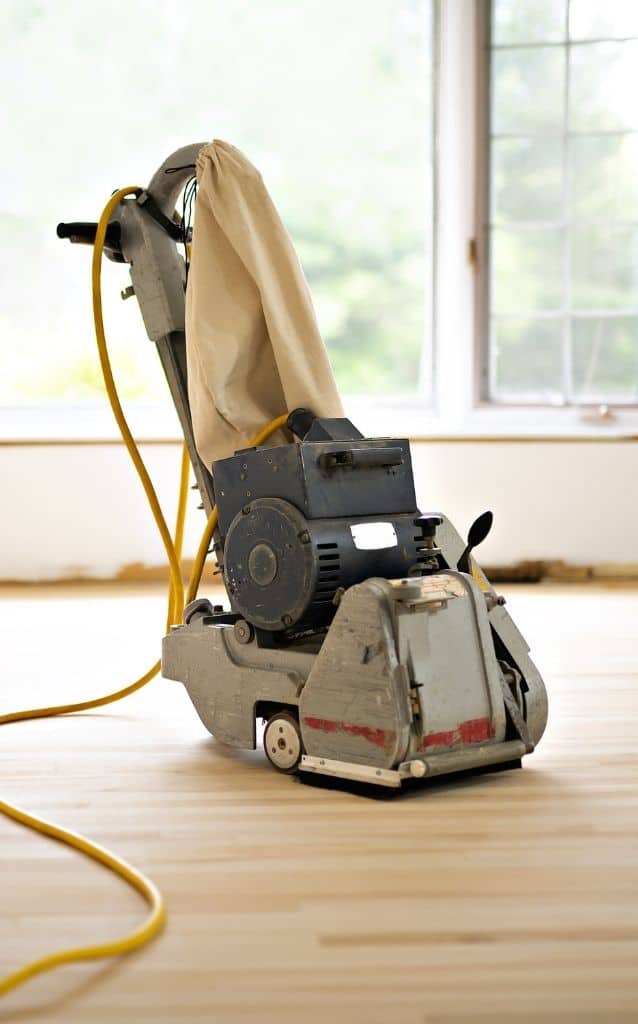
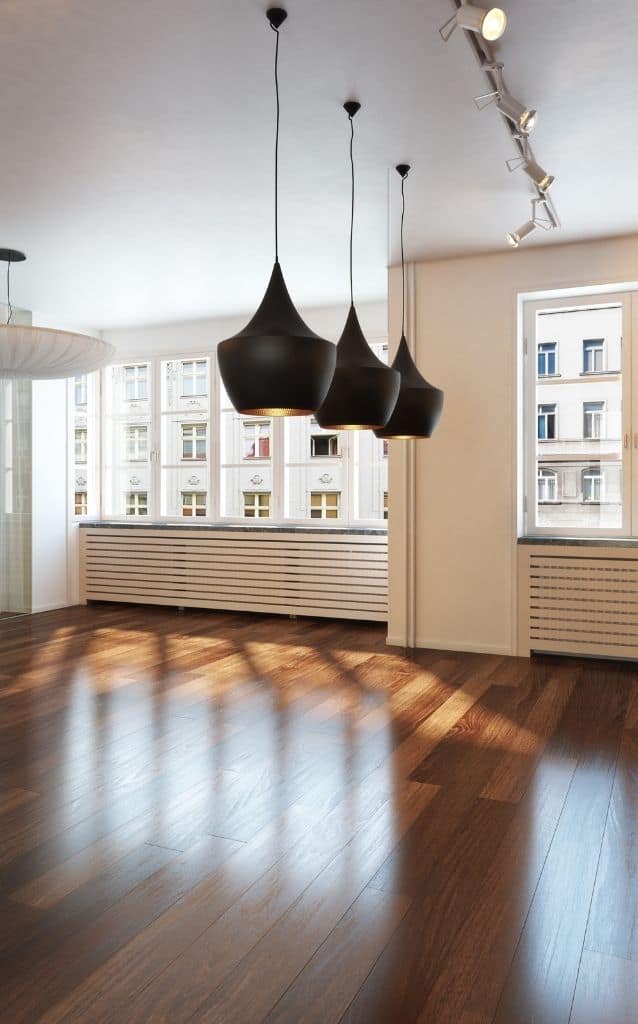
Water-Based Polyurethanes For Floors
There are several key factors to look at when it comes to water-based polyurethane, one being the durability of the overall product. Durability equates to longevity.
PROS
- Clear finish
- Low odor
- Fast drying time (typically within 2 hours, hence you could apply four coats in one day)
- Cleans up with water
CONS
- It doesn’t provide that rich amber-deepening color that comes with oil-based
- It is expensive. It is almost double the price point of oil-based
- You will need to provide 4 coats.
Oil-Based Polyurethanes For Floors
If you have ever walked into a home that has stunningly, dark rich floors, then chances are they have used oil-based Polyurethane. Oil-based polyurethane lasts longer than water-based.
PROS
- Provides a distinctive amber glow
- Fewer coats than water-based
- Contains roughly 45 – 50% more solids, which provides a more protective finish.
- Less maintenance.
CONS
- The odor is pungent
- The dry time is 5 hours and 12+ hours after the last coat is applied. Simply put, you will not be able to use the space, walk on the floor for a few days
Here Are My Top 13 picks For Polyurethane For Hardwoods
Best Water-Based Polyurethane For Hardwood Floors
- Bona Traffic HD (High Grade)
- General Finishes High Performance Water-Based Topcoat – (Best for High Traffic Areas)
- Street Shoe (Med-High Grade)
- Rust-Oleum FBA 230031 Varathane Waterborne Diamond Floor Finish – (Best Value for Money)
- Loba 2K Supra (High Grade)
- Bona Mega (Mid Grade)
Best Oil-Based Polyurethane for Hardwood Floors
- Dura Seal 1G Satin 310 Polyurethane– (Best Value for Money)
- Fabulon Professional Floor Finish Heavy Duty Super Satin
- Lenmar (medium grade)
- Minwax Super Fast-Drying Polyurethane For Floors– (Best Poly for Quick Projects)
- RUST-OLEUM 130031 Varathane– (Best Polyurethane for High Traffic Areas)
- Deft Defthane Interior Exterior Clear Poly – (Best Poly for Hard Areas)
- ZAR 33912 Oil Based Polyurethane Wood Finish– (Best Poly for Small Jobs)
1. Bona Traffic HD High Grade
Is at the top of the list and is considered one of the best water-based polyurethane available. It is commercial grade and highly durable. Bona Traffic HD is a water-based polyurethane that is designed for heavy-traffic areas. It is scratch-resistant and has a satin finish that is easy to clean.
It’s great for everything from a home that has busy toddlers to retail and high-traffic areas. It’s guaranteed to hold up in your home. Bona Traffic is going to hit your pocketbook a little more than its competitors, but it is well worth the additional money. Most flooring professionals recommend Bona
- Safe for all unwaxed, unoiled, polyurethane-finished wood floors
- Safe for all unwaxed, unoiled, polyurethane-finished wood floors
- Low gloss finish
- Antimicrobial additive inhibits the growth of bacteria, mold & mildew
- Adds a protective layer & fills in micro-scratches
- Evens out the appearance of the floor
- A good option to keep oak floors from appearing yellow.
PROS
- Scuff, scratch, and chemical resistant
- Dries quickly
- Low VOCs
- Low Odor
- GreenGuard certified
CONS
- Price
- You have to do additional training
Frequently Bought Together:
2. General Finishes High-Performance Water-Based Topcoat
Winner of Fine Woodworking‘s “Best Overall Choice Award,” High-Performance Topcoat was voted as the hardest, most durable consumer polyurethane topcoat. It is so versatile, that it can be brushed or sprayed.
3. StreetShoe Polyurethane
Street Shoe was once considered the creme de la creme until BONA hopped on the scene and stole its thunder. If you are looking to save some coins, then this is a great option as it is less pricey than its rival Bona. It’s definitely a higher grade and will get the job done.
- Also available in Semi-Gloss, and Gloss.
- Fastest cure available; 90% cured in 24 hours.
- Low VOC and low odor.
- No waste; can be re-catalyzed.
- Superior scratch and scuff resistance.
4. RUST-OLEUM FBA 230031 Varathane Waterborne Diamond Floor Finish
Has superior durability, abrasion resistance, and scuff resistance. It holds up well against common household stains and chemicals.
PROS
- No Odor
- Crystal clear finish
- Easy to clean
5. Loba 2k (High Grade)
- For high-traffic commercial areas.
- 100% solids – solvent-free
- Excellent water resistance, also suitable for bathrooms, kitchens, and other rooms exposed to high humidity
6. Bona Mega
This is a great middle-of-the-road when your budget is a factor. You can still get what Bona brings to the table without breaking the bank. It is the equivalent of riding in a base model luxury SUV.
Bona Mega Wood Floor Finish Satin 1 Gallon
OIL-BASED POLYURETHANES
1. Duraseal Oil (High Grade)
Duraseal reformulated their chemical compounding and the end result is a much superior and stronger oil-based poly. It has the absolute best durability and can stand up to high-traffic areas. It also has a low VOC when compared with other oil-based polys. The smell is not completely gone, but it is more tolerable in my opinion.
2. Fabulon (Med High Grade)
You can’t go wrong with Fabulon. It goes on purple and dries with a rich amber color. The odor is not as intense based on the reviews that I’ve seen. It’s used by both professionals and homeowners for its beauty and ease of maintenance. Fabulon Polyurethane is available in both Semi-gloss, gloss, and satin.
CONS
- 350VOX
3. Lenmar (Medium Grade)
- Smooth, self-leveling finish with superior flow
- High solids for maximum film build
- Resists household chemicals, marring, and scuffing
4. Minwax Super Fast-Drying Polyurethane For Floors
- Superior durability for hardwood floors.
- Optimized drying technology results in faster recoat time between coats.
- No sanding is required between coats.
5. RUST-OLEUM 130031 Varathane
- Provides professional results and long-lasting beauty
- Self-leveling
- Warm Golden Glow
6. Deft Defthane Interior Exterior Clear Poly
Excellent for interior and exterior wood surfaces including floors, doors, furniture cabinets, and marine applications above the waterline.
- This high solids oil based polyurethane is formulated for hard use areas
- Use on unfinished and stained wood, painted, varnished or lacquered surfaces
7. ZAR 33912 Oil Based Polyurethane Wood Finish
ZAR® Interior Oil Base Poly is fast-drying, oil–based polyurethane that dries to a smooth finish on bare wood, in just two hours, with no brush marks.
How To Tell If Polyurethane Is Oil Or Water-Based
Oil-based poly will give off a distinctive amber hue that will continue to darken over time, whereas water-based has a clear coat. Water-based dries way faster than oil-based.
Both oil and water-based are protective coatings that go over the floor to seal it and prevent damage. Damage occurs to the protective coating vs, happening to your floors.
Oil-based polyurethane has a pungent smell that is dangerous for both humans and pets thus you should not be in your home when this work is being done. Make sure you open all the windows. Water-based has no smell and dries quickly, thus you can return home as soon as it is dry. Water-based poly dries much faster, and several coats (up to 4) can be applied in one day
Related Questions On Polyurethane For Hardwoods
What kind of polyurethane should I use on hardwood floors?
In terms of which type of polyurethane to use, it really comes down to preferences. If durability and a traditional amber look are important to you, oil-based polyurethane may be the better choice, especially if you can leave your home. On the other hand, if you prefer a clear finish, faster drying time, and less odor, water-based polyurethane may be the more suitable option. If time is an issue and you want to return home right away, then water-based polyurethane is a better option.Do you have to seal hardwood floors before polyurethane? It is not necessary to seal hardwood floors before applying polyurethane. Polyurethane is designed to provide a protective coating that seals and finishes the wood. However, there are a few scenarios where applying a sealer before polyurethane may be recommended:
- Bare Wood or Unfinished Floors. If your hardwood floors are raw or unfinished, applying a wood sealer can help seal the pores and create a more uniform surface before applying polyurethane. This can help prevent the polyurethane from being absorbed too quickly into the wood, resulting in uneven coverage.
- Damaged or Repaired Floors: If you have repaired or replaced sections of the hardwood floor, it may be beneficial to apply a sealer to the repaired areas to ensure consistent absorption of the polyurethane and a uniform finish.
- Stained Wood: If you have stained the hardwood floors, it is generally recommended to seal the stained surface before applying polyurethane. This helps protect the color and prevents the polyurethane from lifting or smudging the stain.
What is the difference between a wood sealer and polyurethane? Wood sealers are primarily used to seal the wood surface, preventing moisture penetration and protecting against damage from water, stains, and UV rays. They do not provide a high-gloss or durable finish like polyurethane. Polyurethane is primarily used as a protective finish to provide a hard and durable surface that resists wear, scratches, and moisture. It creates a glossy or satin sheen, enhancing the appearance of the wood. Surface Coating: Unlike wood sealers, polyurethane forms a film on top of the wood surface, creating a protective layer that helps to seal and finish the wood.
Resources
Here are some complimentary flooring products that will ensure that your hardwood floors have longevity.
Useful Hardwood Flooring Information
Your floors will last a lifetime if you take good care of them. One of the best investments that you can make is to protect your floors by putting down a good coat of polyurethane..
Bona Traffic HD
Alternatives To Polyurethane
Hands-down polyurethane is the most popular way to finish and protect your floors. Here are several alternatives.
- Varnish- is old school and pre-dates polyurethane. It is made from the sap of wood mixed with alcohol. It produces a much thicker coating
- Wax- You have to spread the wax several times (thin coats after you have stained the flooring) Then you must buff the floor to achieve the high gloss look. I can remember having to buff floors when I was in the army. It is not for the faint of heart.
- Penetrating Oil -I use a version of penetrating oil on my deck. When it comes to your hardwood floors, you will need to put down several coats… It is great for repelling what, however, it does not offer the same protection as polyurethane does when it comes to scratches.
- Aluminum Oxide (Pre-finish) – It’s amazing but it must be applied at the factory, hence your floors will already come with aluminum oxide applied. It is not something you can go and pick up from Lowes or Home Depot.
Final Thoughts
Your floors will last a lifetime if you take good care of them. One of the best investments that you can make is to protect your floors by putting down a good coat of polyurethane. Do your research and make sure that you find a qualified contractor that knows flooring. You get what you pay for and skimping will more than likely result in you having janky floors that you are not pleased with.

Related Polyurethane And Refinishing Hardwoods Post
- Water Based Vs. Oil-Based Polyurethane Floor Finish -The Pros & Cons
- Is Polyurethane Waterproof?
- Hardwood Flooring Trends
- Best Vacuums For Hardwood Flooring
Were my tips beneficial to you? If they were, feel free to show your appreciation by buying me a coffee and supporting my blog.
Buy me a coffee













